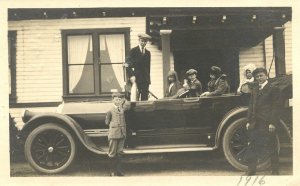- Home
- About Us
- Join/Renew
- Member Benefits
- Member Pages
- Log In
- Help
- Museum Store
May I suggest revisiting PASB 2011-1 for a discussion of rebuilding Ross steering gears. It discusses (p2-3) the Alemite zerk found on Late 36-thru 38 PA’s, that they were intended to oiled, and that Alemite currently markets a lever-operated oil gun for that purpose. Note that the Ross box is vented (p4-5), so oil can be pressure delivered to the box until it exudes from the vent hole. After installation of modern lip seals, the box operates on transmission weight oil without leaking.
My 1703 cooling system takes 38 quarts. I imagine that yours would be similar.
Bob
Ed, in your 9/30/11 post above, you say that ….”you must not put too much oil on the chain, or you can get lifter tick at idle”. Could you elaborate on that comment? Does too much chain oil flow starve the lifter gallery? or??
Bob
Inadequate chain oiling is well known to Pierce 12 owners. Seagrave engines did have an external oil line added. Seagrave ran a copper line from the frontmost plug in the rightside oil gallery to the top of the chain cover. The 1/4″ elbow at the cover was plugged with solder and drilled to allow only a drip feed to the chain. There is another difference, too. The Pierce pressure control valve in the oil pump is drilled (#52 drill) to allow some circulation thru the pump. When Seagrave fed some oil off to the chain cover, they blocked this hole with a ball bearing (and used a shorter softer control spring). I suspect they did this to ensure that the additional bypass flow would not reduce oil pressure to the engine bearings when idling at normal operating temperature. Pierce 12’s idle at very low oil pressure when hot. I used Seagrave fittings on my 1703 engine and it seems to work well (no road miles yet, however).
Motor’s Factory Shop Manual (1937) shows clutch facing specifications for 1931 thru 1933 as 6-1/4 x 9-3/4 x .130 inches. My P-A parts list shows 1929 thru 1933 used the same clucth plate, p/n 701005. So, your facing should be .130″.”
Another Winter project for the 1703; assist straps. A local guy scanned the pattern from my originals and stitched them up with a computerized machine. I had the edges of both the fronts and backs marrowed (that’s the overstitching around jacket patches)and hand sewed them together. He will do more, if anyone wants them, as he is keeping the software on file.
1703 steering gear ready for reassembly. John Cislak provided the numbers for the modern lip seals (471744 and 471750) to replace the cork and leather originals. The loose balls are readily available at specialty fastener stores and the lever shaft needle bearings are still a current number (B-2016).
One of a series of early PA photos in a Seattle family album.

George,
You may be correct, but for the wrong reason. The correct mensuration formula for the area of a circle is pi x r squared (2pi x r = circumference). John is correct, a 2-1/2″ is larger in area than a 2″ pipe by about 50%.
However, Doug’s posts only talk about a 2-1/4″ system, which would be about 27% larger than a 2″ system.
Regarding your concern for the header pipe size. This is a twelve with each bank’s pipe coming to a siamese joint just before the first muffler. Each pipe only needs to be 1-3/4″ diameter to be half of a 2-1/4″ system.
Bob
If you cannot find an original switch replacement, you might try a repair. I have carefully pried up the tabs, disassembled everything, cleaned the contacts, bead blasted the case and replaced the spring in mine. I now have a good working switch.
This is a two-man job. First, with everything face down on a table, install the louvers into the upper assembly and tape securely. Then, with the lower assembly in an upright position, lower the upper assembly/louvers down over it. Align each lower pin to its hole and secure the side bolts.
Thanks for the suggestion, but I have contacted both Kent Jaquith and Fiken. Neither has original arms or transmission linkages. The only hope is that a member has something to spare. Anyone have something?
Tony,
I once found the source of a whistle to be an incorrect carb-to-manifold gasket. If you disturbed the gasket during your work, I would suggest checking there.
You can get double-wire clamps from McVey’s in Kansas, 913-722-0707.
Marc, I suspect that your runningboard antenna would be similar to the one on my 1703. It consists of metal straps suspended between the runningboard brackets, insulated with rubber and attached with tensioning springs. I had the insulators reproduced and have some spares. If you’re interested, I could send along some photos of my original antenna.
I was unable to find the mentioned website. Please help.
Sorry, that should read Stromberg.
